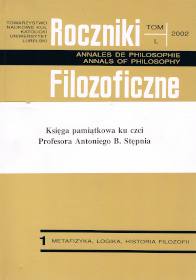Epistemology in the teaching of physics by the Commission for National Education
Abstract
The subject of the article is defining the specificity of broadly understood epistemology (theory of cognition, methodology of science) that could be seen in the teaching of physics at secondary schools (and partly also at universities) run by the Commission for National Education. It was the first European „ministry” of education, which worked in Poland in the years 1773-1795. Its specificity was defined by a new model of school directed to scientific rather than linguistic-humanist, and on a higher level − also than philosophical education. On the level of syllabuses it meant replacing lecturing Aristotelian philosophy of nature with phenomenalistic-mathematical natural science (mechanists), oriented to technical-economic practice (utilitarianism). The syllabuses declared so radical a break up − in the spirit of pre-positivism of The French Encyclopaedia − with traditional education that at secondary schools practically all the philosophical subjects were removed, apart from logic and ethics, and at universities logic was cancelled too. However, the teaching practice differed from the syllabus and organisational radicalism that was incomparable with any other education system functioning in Europe. In it numerous handbooks written in the circle of the so-called philosophia recentiorum were used. It joined the Aristotelian philosophy of nature with elements of modern natural history. Introduced into the secondary and university education in the whole of Europe in the first half of the 18th century, it broke the framework of the traditional philosophy syllabus. Also the handbooks of the Commission for National Education − like all of the eclectic school physics of the Enlightenment era − still contained philosophical elements, with the idea of justifying them inductively. However, at the same time numerous troubles appeared resulting from putting into effect the empirical-mathematical ideal of natural history. This was the result of shortage of instruments necessary for performing experiments, even on the didactic level that dominated over research work in the Polish science of that time. Also doubts were expressed as to the possibilities and range of applying the language of mathematics for defining the data obtained in experiments. This resulted from a low methodological level of natural science of that time that still had a describing-systematising character (natural history, partly also physics). Hence doubts appeared in defining the mathematical status of natural science, still treated as applied mathematics, or as an integral − sometimes even first-rate − element of physics. Especially development of mathematically defined mechanics and the possibilities of applying it in technology gave a higher prestige to reflection over technical--economic activity, which led to general acceptance of the ideal of applied science preferred at those times.
Copyright (c) 2002 Roczniki Filozoficzne

This work is licensed under a Creative Commons Attribution-NonCommercial-NoDerivatives 4.0 International License.





